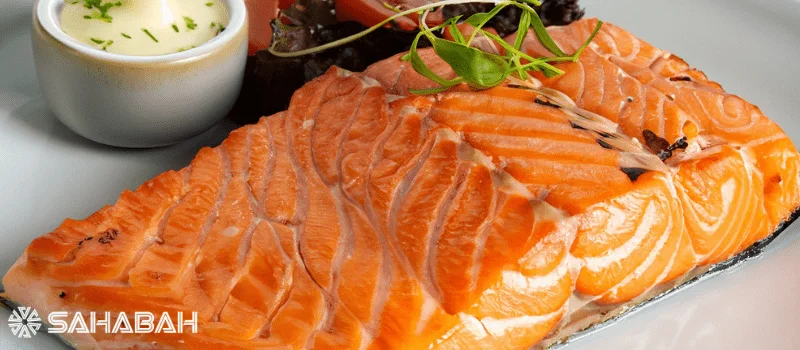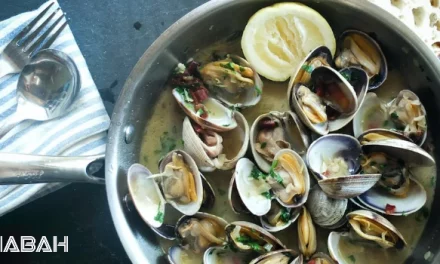As a Muslim seeking to adhere to halal dietary guidelines, understanding the halal status of various food items is crucial. In this comprehensive guide, I will delve into the intricate details of decoding the halal status of salmon, providing you with the knowledge and confidence to make informed choices when it comes to consuming this popular seafood.
Decoding the Halal Status of Salmon for Muslims
The halal status of various foods and ingredients is an important issue for Muslims who wish to adhere to Islamic dietary laws. Halal refers to permissible foods and substances according to Islamic law.
Definition of Halal
According to Islamic jurisprudence, for a food or ingredient to be considered halal, it must meet certain requirements:
- It must not contain or come from anything considered haram, or forbidden. This includes pork, blood, alcohol, and carrion.
- It must be from an acceptable lawful source. This applies to meat, which must come from animals slaughtered according to Islamic guidelines.
- No contamination or use of unlawful ingredients during processing and manufacturing.
Categories of Halal and Haram Seafood
Seafood can be classified into several categories regarding halal status:
- Halal: Fish with scales and shrimp/prawns are universally accepted by scholars as halal. This includes popular choices like salmon, catfish, and tilapia.
- Haram: Marine creatures without scales are considered haram, such as eel, octopus, lobster, and oysters.
- Debate: Shrimp, crab, and squid are subject to differing opinions among scholars.
So the halal status of salmon, the topic of this article, depends on proper analysis of its qualities according to Islamic criteria.
Salmon’s Status in Islam
Salmon is considered halal and permissible to eat by the vast majority of Islamic scholars. However, there are some dissenting opinions on the halal status of salmon.
Majority Opinion of Permissibility
- Most major Islamic dietary organizations and scholars agree that salmon is halal for Muslims to consume.
- This includes the halal food authorities of many Muslim countries like Malaysia, Singapore, and the UAE.
- The basis is that salmon fulfills theScaling criteria for halal seafood in Islamic law.
Evidence of Salmon Having Scales
- Salmon are scientifically proven to have thin scales along their body that make them permissible.
- These scales may be difficult to see or removable on farmed salmon. But their existence still allows it to meet halal guidelines.
Minor Opinions Against Halal Status
- A minority of scholars argue that farmed salmon in particular cannot be halal due to lack of scales.
- Others say since scales are not always visible, there is doubt about salmon’s halal status.
- But these dissenting views are overwhelmingly rejected by most major Islamic opinions.
In conclusion, there is a strong consensus that salmon is considered halal for Muslims to eat based on textual evidence and scales. But a small minority disagreement remains.
Scales on Salmon
The key determining factor for salmon’s halal status is the presence of scales on their body. This section examines the nature of salmon scales and the debate around their significance for permissibility.
Description of Salmon Scales
- Salmon have small, thin cycloid scales that cover their skin and give it a smooth, slippery texture.
- These scales are soft and delicate compared to the hard scales of fish like carp or bass.
- They can be difficult to see with the naked eye and are often removed during filleting in farmed salmon.
Scales Make Salmon Halal According to Islamic Law
- The major reason salmon is considered halal is because it meets the scaling requirement for halal seafood in Islamic dietary law.
- Having identifiable scales, even thin or soft, indicates the fish is permissible to eat for Muslims.
- This parallels kosher laws in Judaism, which also allows fish with scales like salmon.
Counterarguments Regarding Salmon Scales
- Critics argue farmed salmon lose their scales easily, so cannot be guaranteed to have them.
- Some claim scales are not present year-round during salmon’s lifecycle.
- But majority of scholars dismiss these doubts due to verified evidence of scaling.
In summary, the scales definitively classify salmon as halal according to mainstream Islamic scholarship. But a minority objection persists about loose or impermanent scaling.
Catching and Processing Considerations
In addition to having scales, there are some other factors in how salmon is caught and processed that may impact its halal status.
Wild vs Farmed Salmon
- Wild salmon catch methods are considered halal, but some argue farmed salmon cannot be halal due to dubious practices.
- However, major halal certifiers like JAKIM in Malaysia accept farmed salmon if raised and slaughtered properly.
Stunning Before Slaughter
- Farmed salmon is often stunned before slaughter, which some scholars say can render it haram.
- But most experts permit salmon stunned for welfare reasons, since it is still alive when slaughtered.
Use of Non-Halal Ingredients
- Certain ingredients used in salmon processing like pork gelatin would clearly make final products haram.
- But major halal salmon producers avoid such substances, so this is not an issue for most mainstream salmon sold.
In summary, there are some questionable practices in salmon fishing and production that conservative Muslims may want to avoid. But these do not prohibit it from being halal altogether when proper conditions are followed.
Final Rulings by Major Islamic Bodies
Given the evidence and analysis so far, Islamic authorities have definitively ruled on salmon’s halal status for Muslims.
Official Permissibility Rulings
- The Malaysian Department of Islamic Development (JAKIM) has certified farmed salmon as halal if slaughtered properly.
- The UAE’s ESMA also approves salmon as halal based on it having scales.
- Indonesia’s LPPOM MUI halal certification body also allows salmon for Muslim consumption.
Basis for Salmon Being Halal
- These halal authorities all cite the textual evidence of salmon having scales for permissibility.
- They also reference the consensus of mainstream Islamic scholarship accepting salmon as halal.
- Factors like stunning or loose scales are dismissed as not prohibitive.
Remaining Uncertainty
- A few conservative Muslim critics still argue against farmed salmon in particular.
- But the official halal certification bodies consider this minority opinion unreasonable.
- They conclude overwhelmingly that Muslims can consume salmon in general.
So the preponderance of evidence and Islamic legal opinions point to salmon being halal for Muslims to eat.
Conclusion
In conclusion, the preponderance of evidence points to salmon being permissible for Muslims to eat.
Summary of Evidence for Salmon Being Halal
- Salmon have identifiable scales, meeting the key criteria for halal seafood in Islam.
- The majority of scholars and halal certification bodies have declared salmon to be halal.
- Official halal approval has been given for salmon by organizations like JAKIM and ESMA.
Minority Opinions and Areas Needing Analysis
- A minority of scholars still argue against farmed salmon in particular being halal.
- More analysis may be needed on stunning methods and ingredients for certain salmon products.
- But these issues do not prohibit eating typical mainstream salmon.
Final Judgment on Salmon Being Halal
Given the weight of evidence of salmon having scales and mainstream Islamic approval, the final judgment is that Muslims can consume salmon in general.
However, Muslims concerned with more conservative halal standards may want to investigate the source and processing of certain salmon products further.





